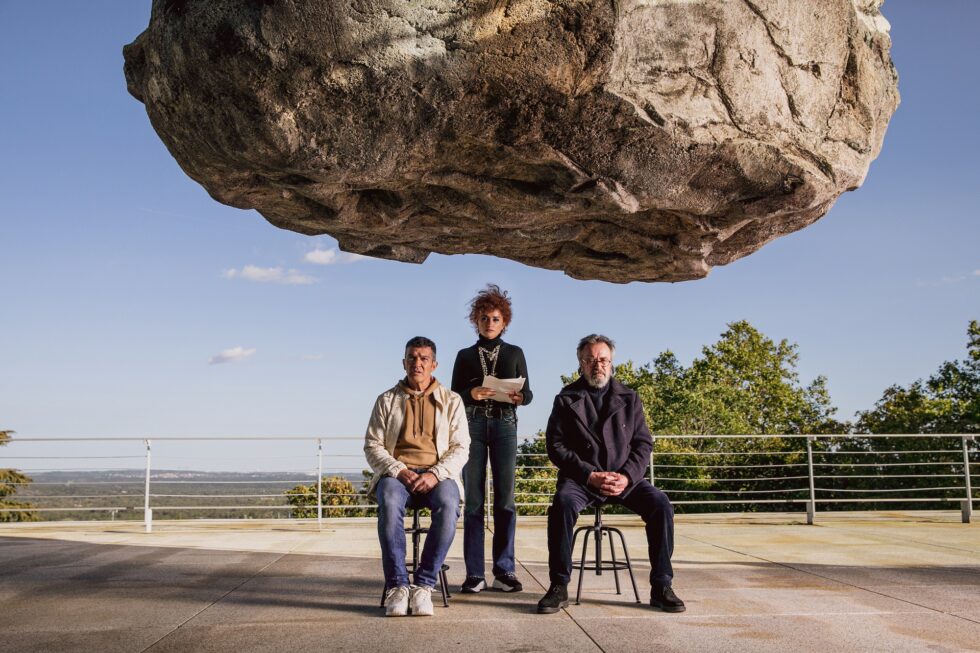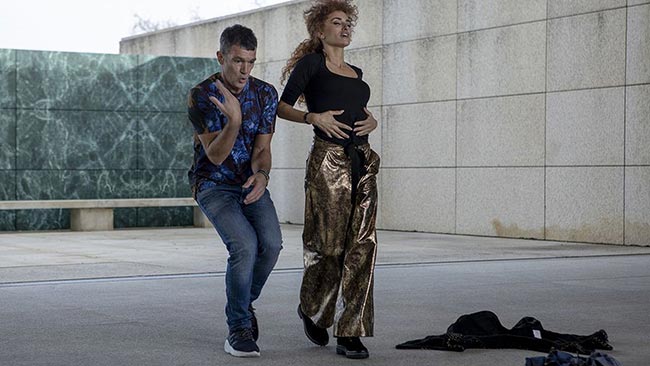MOVIE REVIEW – A billionaire businessman decides to make a film that leaves his mark on history. He hires the famous filmmaker Lola Cuevas, the Hollywood star Félix Rivero and the radical stage actor Iván Torres. They are a brilliant team that cannot work together. Rivero and Torres may have enormous talent, but they have even bigger egos. Lola throws them a series of increasingly imaginative challenges…
As the film’s title indicates, there is an obvious mise en abyme in the narrative proposed by Gaston Duprat and Mariano Cohn. This feature film is partly about cinema and, more particularly, about constructing a film behind the scenes. It is not about shooting, but about gathering a team on the project of a film, and then, especially about the preparations that will finally lead to the shooting because it would take too long to go back over the whole construction chain. Except that Official Competition is a satire and a not very aggressive comedy. Rather good-natured, the two filmmakers have fun with their characters to ironize on the celebrity and the need to produce a great film that will unleash passions. Before meeting the public, the people’s passions working on the film are explored. This is a story with three heads and three points of view: the Palme d’Or winning filmmaker Lola Cuevas (Penelope Cruz), the Hollywood star Felix Rivero (Antonio Banderas) and the theatre actor Ivan Torres (Oscar Martinez). Obviously, the three personalities will clash. Even if the film opens with a businessman who decides to produce a film to leave a trace in history, he is no longer at the story’s heart.
Three strong characters
Three strong characters meet, trying to work together. The filmmaker is a demanding and wild person at the same time. The Hollywood star is pretentious and needs all the attention. Then the stage actor is rather discreet, down earth and radical in his ideas. Beyond their respective supposed talents, a battle of egos takes place in this comedy. Three points of view mean three different worlds. That’s what makes this film so interesting. Duprat and Cohn use every detail to identify each other’s universe to ironize and bring a bit of burlesque when they have to connect. Each personality has its own projection in the set and the staging. Penelope Cruz’s character projects her eccentricity and sense of excess (a scene with a big rock hanging over the two actors is very funny). Antonio Banderas’s character projects his refinement and permanent decadence, Oscar Martinez’s character projects a sense of knowledge and discretion. With these three universes projected in one and the same field of the frame, the whole process of creation passes from the imaginary to the real.
Biting humour
The film has biting humour and a rather sharp analysis of film creation, but it uses it precisely to celebrate the artist’s vocation. It doesn’t matter what form it takes: whether it’s filmmaking, acting, or even through the appearances of the people in charge of costumes, sets, etc. Spaces are thus significant in the rhythm of the story. Even though it is above all a comedy, there is a real desire to leave space for the characters’ imagination to study their creative process anchored in reality. That is to say: the imaginary is always bigger than the real. It has a space that is always denser. So, to give it all the space it needs when it comes to showing the preparations for a film, we have to give the means to the real to push it beyond, for example, by transforming spaces. When a theatre stage becomes a place of destruction rather than creation, when a reception area becomes a scene of danger, when a dark and empty studio becomes an (almost) entire world, etc., whether it is through the characters (and their egos) or through the spaces they occupy in preparation for this shoot, it is all about image. The one they try to give and create determines the place they take.
To each their personality
That’s why the attitudes of Penelope Cruz, Antonio Banderas and Oscar Martinez are critical. To each their personality, to each their way of occupying the space. The theatre actor is rather discreet and the oldest of the three. He is, therefore, the one who does not try to transcend the space but to impose himself by the force of words. On the contrary, the Hollywood star invites several counter-plongées because he likes to be seen and show himself. Always with a lot of colours, unlike his partner in the film, he seeks to radiate and blind as he likes to recall all the awards he has won. He is also a character who gets agitated a lot, rather angry (and easily), so much his body is a more important tool for him than his mind.
Then there is the filmmaker. She doesn’t try to occupy all the space or impose herself like a conductor or a sports coach, demanding but wild. She is rather the one who initiates the movements, which indicates the directions of the camera of Duprat and Cohn. She allows for some very offbeat and funny scenes, but she is above all at the heart of spontaneity. It is because the imaginary madness of this filmmaker is built little by little that the satire is solid. A madness that reveals a great sensitivity because her sense of excess is as important as the emotions she expresses about everything she witnessed in her life. Images where an artist’s imagination comes out of its shell but which do not go much further than this spirit of satire without removing its entertaining side.
Some parts of the film, especially towards the end, may seem too predictable for some viewers. Still, these narrative choices do not detract from the overall experience. Despite its commitment to biting humour and sharp analysis, Competencia Oficial is, at its core, a celebration of artists and their processes.
-BadSector-
Official Competition
Direction - 9.2
Acting - 8.4
Story - 7
Visuals/music - 7
Ambiance - 8.6
8
EXCELLENT
Some parts of the film, especially towards the end, may seem too predictable for some viewers. Still, these narrative choices do not detract from the overall experience. Despite its commitment to biting humor and sharp analysis, Competencia Oficial is, at its core, a celebration of artists and their process.















![[TGA 2025] Star Wars: Galactic Racer Focuses on High-Stakes Podrace Runs [VIDEO]](https://thegeek.games/wp-content/uploads/2025/12/theGeek-Star-Wars-Galactic-Racer-300x365.jpg)



Leave a Reply